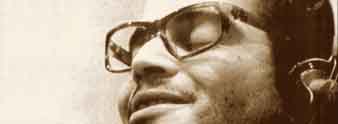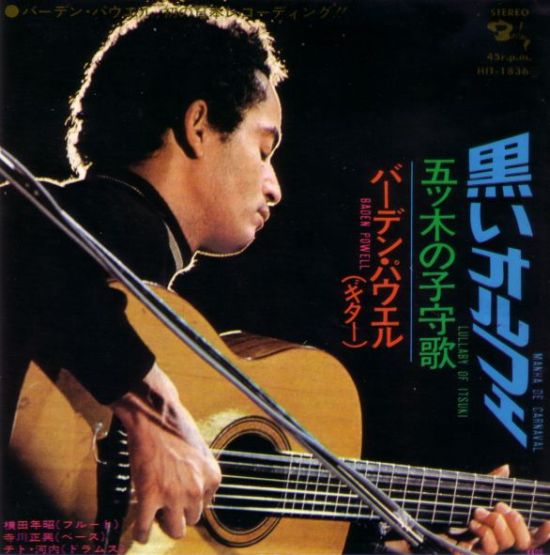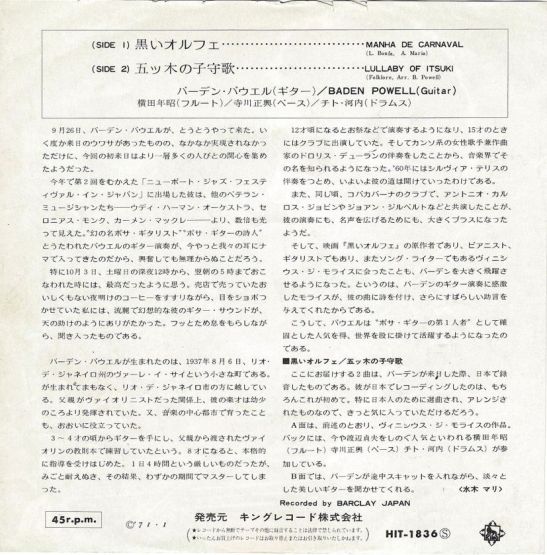|
BrazilOnGuitar says: We considers this Japanese single to be among the rarest recordings by Baden Powell. They can be so hard to find, that one rather believes them to be a biographical myth than actually existing. BP recorded the two titles at 2 November 1970, not with his quartet, but exclusively with Japanese musicians. Very little could be found out about them, except for the flutist Toshiaki Yokota, who was a well known shakuhachi player at that time und shows this art in his interpretation of Manha de carneval. Regrettably Baden did not record further titles with this combo, a musical and cultural encountering that produced only two titles.
A brazilian master guitarist, with classical education and a passion for Jazz, together with a Japanese combo, who combined Jazz and classical Japanese elements. They were far ahead of a time where such recordings would be called world music.
Itsuki is a small town in Kumamoto and this old japanese folklore song on the b-side, Itsuki-no-komoriuta, is from the 2nd half of the 16th century. BP recorded this title especially for this single for the first time and later in another version on the LP Baden Powell On Stage.
Both versions are remarkable arrangements for solo guitar und have nothing in common with later merely commercial arrangements of Japanese songs on the record Shiretokoryojou - Hanayome in 1970. By contrast, both recordings of Itsuki-no-komoriuta, recited in an earnest and graceful manner, make audible the tragedy, that is told in the lyrics of the Itsuki-song: "I'm a beggar. You are rich, with obi and rich kimono. Who will weep if I'm beaten to death, but the cicadas on the pines. No, not the cicadas, but my young sister who would cry for me."
BrazilOnGuitar wonders, which example Baden Powell had for his arrangement of this folklore title. Probably, it has been the record Flute et Koto du japon (Festival FLDX 526, 1970) with the great Goro Yamaguchi playing the shakuhachi.
Backcover translation of the single:
On Sep.26, 1970 finally Baden Powell came to Japan. In the past, there were a couple of rumor which he would come to Japan, but never happened before, so his visiting Japan made many people be very interested in.
He attended second New Port Jazz Festival In Japan, and he was much better than other veteran Jazz musicians like Monk, Carmen Mcrae.
Many people could not hide their exciting feeling, because finally we could listen his live performance which was called Legend of Bossa Nova Guitar Poet.
Specially, it seems the best from midnight to 5:00am on Oct.3, Sat. his guitar sound was very fluent and fantasy like aid from heaven for me who was drinking very bad test of coffee and had sleepy eyes at the dawn..
Baden Powell was born on Aug.6 1937 at the small village in Rio de Janeiro states.
His family moved to downtown in Rio de Janeiro, after he was born. His talent of music was bloomed from when he was young because his father was violinist. And also because he grown up in the center of music city.
He started to play the guitar when he was 3-4 year old, and trained with the his father's music score of violin. And when he was 8 year old, he took professional class of guitar.
He passed tough course which has 4 hours lesson a day, so that he mastered playing guitar in very short time..
He played guitar in the small festival when he was 8 year old, and he started to play guitar in the club when he was 15 year old.
And he was getting popular after he played with female star singer Dolores Duran.
He played as sideman for Sylvia Telles in 1960, and the road for star was opened for him.
Also play with Antonio Carlos Jobim, Joao Gilberto and others in club at Copacabana made him be more popular.
And also meeting with Vinicius de Moraes who is the author of Manha De Carnaval, pianist, guitarist and song writer made him more grow and be more famous.
It means that Vinicius loved his guitar and he wrote poem for his songs, and gave him many advice. Those above experience or relationship with above people made his status as No.1 Bossa Nova Guitarist all over the world.
+ Manha De Carnaval / Lullaby of Itsuki
Baden recorded those 2 songs when he was in Japan. Of course this is his first recording in Japan. I hope the Japanese audience love those songs, because this songs were selected and arranged for Japanese audience.
Side A is Manha De Carnaval which was written by Vinicius De Moraes [sic!] as above. Back musicians are Toshiaki Yokota (Flute) who is much popular than Sadao Watanabe now, Terakawa (bass) and Chito Kawauchi (drums)
On Side B, Baden play guitar with scat sometimes, and it's very beautiful and wonderful. - Mari Mizuki, January 1971
-----
We thank Kiyohito Koizumi, Susumu and Jerome for the help to get the record and Robert for their translations. Thanks to
Yoshioka Shinichi for his detailed informations.
|


